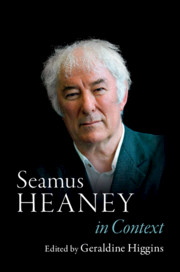Book contents
- Seamus Heaney in Context
- Seamus Heaney in Context
- Copyright page
- Dedication
- Contents
- Contributors
- Acknowledgements
- Abbreviations
- Introduction
- I Mapping
- II Influences and Traditions
- III Poetics
- IV Publishing
- V Frameworks
- Chapter 19 Catholicism
- Chapter 20 Classical Roots
- Chapter 21 Politics
- Chapter 22 Education
- Chapter 23 War and Peace
- VI Critical Contexts
- VII Legacy
- Index
Chapter 19 - Catholicism
from V - Frameworks
Published online by Cambridge University Press: 15 March 2021
- Seamus Heaney in Context
- Seamus Heaney in Context
- Copyright page
- Dedication
- Contents
- Contributors
- Acknowledgements
- Abbreviations
- Introduction
- I Mapping
- II Influences and Traditions
- III Poetics
- IV Publishing
- V Frameworks
- Chapter 19 Catholicism
- Chapter 20 Classical Roots
- Chapter 21 Politics
- Chapter 22 Education
- Chapter 23 War and Peace
- VI Critical Contexts
- VII Legacy
- Index
Summary
This chapter traces the arc of Heaney’s progression from faithful and engaged Catholic in the 1940s, 191950s and even 60s to a more sceptical stance in the years following Vatican Council II. It sees Station Island (1984) as the axial moment where disbelief is fully acknowledged. Still, the 'Troubles' in Northern Ireland make a cultural departure from Roman Catholicism moot, while the poet’s respect for a believing Czesław Miłosz and others cautions against total rejection. Heaney’s tortured conflict with Philip Larkin’s 'Aubade' points to the attraction of the latter’s post-religious stance even as the narrowness of its focus is achingly condemned. A consciously unorthodox Heaney exits with most of the rites of a more liberal but declining Irish Catholic Church that celebrates his passing without rigorously scrutinizing his creedal beliefs.
- Type
- Chapter
- Information
- Seamus Heaney in Context , pp. 211 - 220Publisher: Cambridge University PressPrint publication year: 2021

